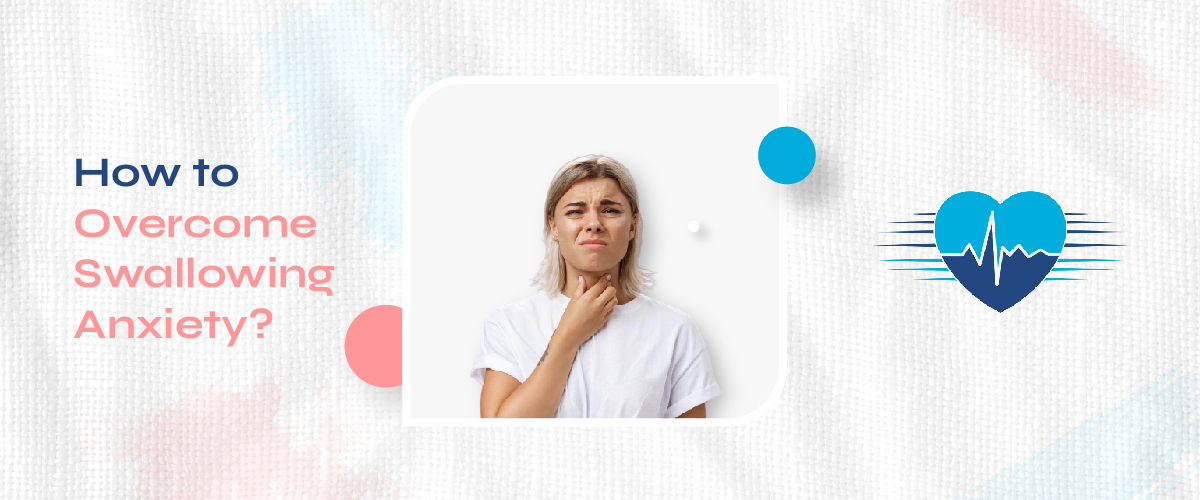Swallowing anxiety, or phagophobia, causes fear and trouble swallowing food, drinks, or medication. This can affect one’s happiness and life quality.
Thankfully, there are useful ways to deal with and overcome this anxiety.
Below, we’re going to explore all these strategies.
What Is Swallowing Anxiety?
Can anxiety cause swallowing difficulties? Yes, it can.
Swallowing anxiety is a psychological condition where swallowing becomes associated with fear and panic.
This fear of swallowing can be so strong, it leads to avoiding specific food or abstaining from eating altogether. It’s not a physical swallowing problem, but stems from mental factors.
Symptoms of Swallowing Anxiety
Common symptoms include:
- Fear of choking
- Feeling like something’s stuck in the throat
- Avoiding certain foods or eating situations
- Feeling your heartbeat racing or panic attacks when trying to swallow
- Trouble swallowing pills or large bites
Identifying the Causes of Swallowing Anxiety
Psychological Factors
Anxiety and difficulty swallowing often comes from psychological factors such as:
- Traumatic experiences: A choking incident from your past or seeing someone choke can bring back the fear.
- Generalized anxiety: People with general anxiety disorders can develop to certain fears, including swallowing anxiety.
- Stress and pressure: High stress levels can show up in different ways, including swallowing difficulty.
Physical Factors
Although involuntary swallowing anxiety is primarily psychological, physical conditions can exacerbate the issue:
- Gastroesophageal reflux disease (GERD): This problem might make you feel a block in the throat.
- Throat infections: When your glands swell or throat hurts, you can find swallowing tough, raising fears.
- Neurological disorders: Diseases like Parkinson’s can affect swallowing thus boosting anxiety.
How to Overcome Swallowing Anxiety?
Here’s how to get rid of swallowing anxiety.
Relaxation Techniques
Relaxation methods can assist. Consider this:
Deep Breathing
Deep breathing can soothe your mind and body, aiding in easier swallowing. Here’s a simple routine to follow:
- Breathe in through your nose, count to four.
- Hold your breath for a count of four.
- Likewise, breathe out from your mouth, count to four.
- Do this routine multiple times until you sense calmness.
Progressive Muscle Relaxation
Here’s a simple method to ease tension:
- Start with your feet and work your way up to your head.
- Tense your muscles for five seconds then relax for another 15 to 20 seconds.
- Focus on the sensation of relaxation and let go of any stress.
Cognitive Behavioral Therapy (CBT)
CBT is a therapy form that assists you in altering negative thoughts linked to apprehension and swallowing. Therapists will aid you in:
- Identifying and challenging irrational fears
- Developing coping strategies
- Slowly exposing you to feared situations in a controlled manner
Mindfulness and Meditation
Mindfulness and meditation are tools that are useful for maintaining calm and focus. Key methods involve:
- Mindful eating: Focus on the texture, flavor, and the feeling it incites as you consume the food. Eat with patience and intent.
- Guided meditation: Utilize apps or online guides to meditate, these sessions can specifically aid with anxiety.
Gradual Exposure
Little by little, start to face your swallowing fears. Begin with:
- Small sips of water.
- Soft foods like yogurt or applesauce.
- As comfort rises, upsize the food portion and texture bit by bit.
Proper Chewing and Swallowing Techniques
Discovering the right chewing and swallowing methods can alleviate fear. Suggestions are:
- Completely chew food prior to swallowing.
- Take bite-sized pieces.
- Pair solid foods with a sip of water to aid swallowing.
Professional Help
Speech and Language Therapy
A person can get help with their anxiety about swallowing from a speech therapist. This professional teaches helpful swallowing methods and practices. They also offer comfort and direction along the way.
Medical Evaluation
A key step is to make sure no medical issues are causing the swallowing fear. A doctor or other medical expert can do a full check-up then suggest what to do next.
Self-Help Strategies
Positive Affirmations
Using positive affirmations can help build confidence and reduce anxiety. Examples include:
- “I can swallow with ease.”
- “I am in control of my body.”
- “I am calm and relaxed while eating.”
Support Groups
Get into support groups. They give a strong feeling of belonging and joint experiences. Working through challenges and sharing victories with people who get it can be really uplifting and motivational.
Healthy Lifestyle Choices
Maintaining a healthy lifestyle can also contribute to reducing anxiety. This includes:
- Regular exercise
- Balanced diet
- Adequate sleep
- Limiting caffeine and alcohol intake
When to Get Help
If constant swallowing anxiety is impacting your life, reach out to professionals who can help get advice from therapists, speech therapists, and healthcare providers. They have tools and support to help you tackle this hurdle.
Final Thoughts
Beating swallowing anxiety involves understanding why it happens, practicing calming methods, seeking out experts, and making health-focused choices. This way, you can regain your fearlessness and get back to enjoying your meals.
Get Help from Today Telemedicine
Today Telemedicine is there for you if swallowing anxiety is affecting you.
Get support and expert advice from us.
Start your journey towards recovery now. Simply reach out to Today Telemedicine to take the first crucial steps – free yourself from excessive swallowing anxiety.
FAQs
How to overcome swallowing anxiety?
Try calming exercises, drink water, and think about talking to a therapist for CBT.
Can dysphagia be caused by anxiety?
Yes, anxiety can cause muscle issues and mess up your coordination, leading to dysphagia
Can anxiety cause swallowing issues?
Absolutely. Anxiety can tighten the throat muscles, making swallowing tough.
Trouble swallowing with anxiety?
If you experience trouble swallowing due to anxiety, try deep breathing exercises and seek professional help if it persists.
Can anxiety cause difficulty swallowing?
Yes, stress can interfere with swallowing due to muscle stiffness and stress responses.
How to overcome the fear of swallowing?
Calming techniques and therapy to deal with the underlying anxiety can help.
How to stop swallowing when anxious?
Focus on deep breathing exercises and relaxation techniques to reduce anxiety levels.
How do you fix difficulty swallowing?
A healthcare professional can diagnose and suggest treatment, which could be therapy or medication.





